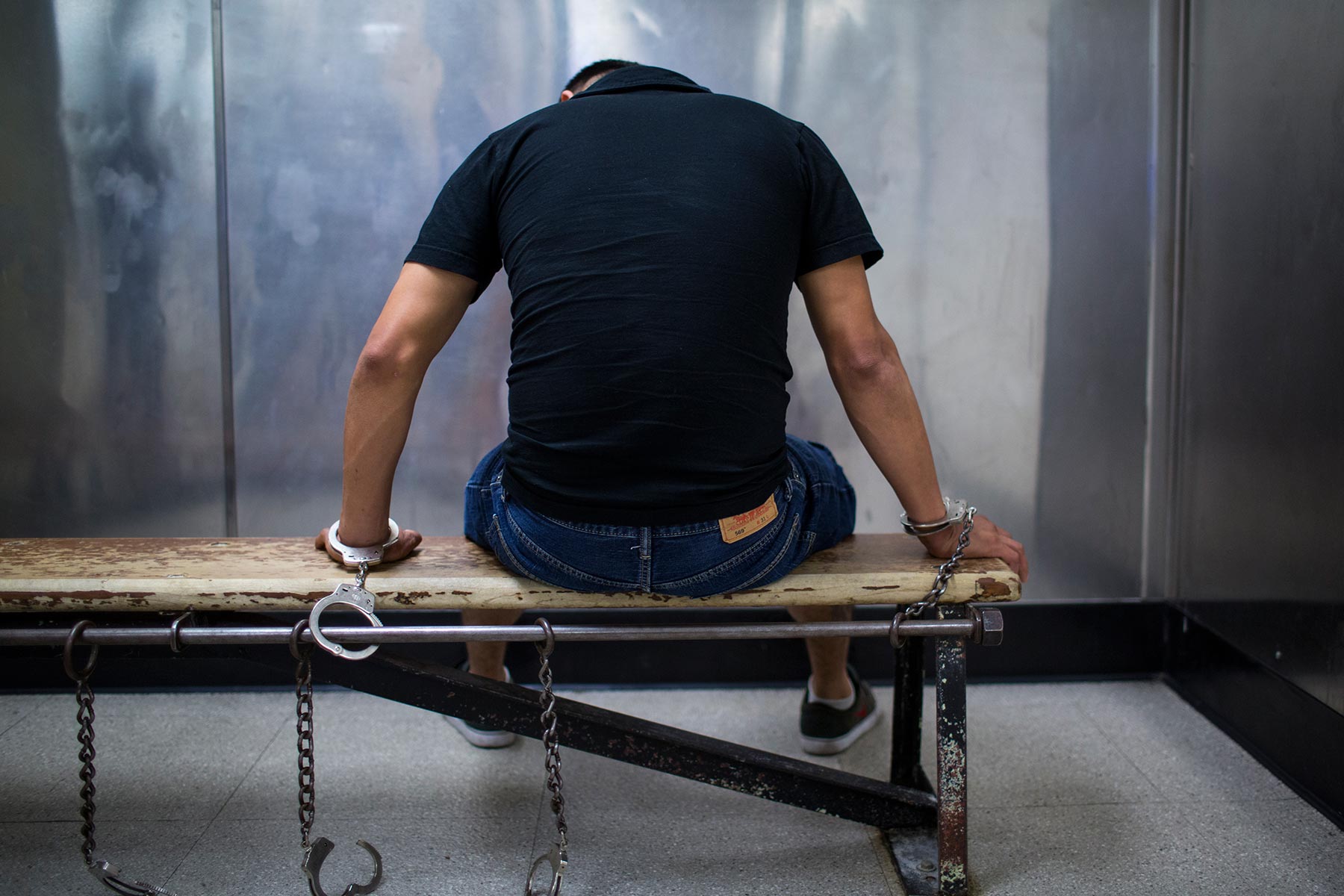
Getting away with it: The johns
Law enforcement has started to focus on attention on the demand side of sex traffficking
Series
This is part two of a seven-part series about sex trafficking.
The men looked sleepy. It was 9 a.m. on a Saturday, and they sat, about 20 of them, in rows of stackable metal chairs, facing the front of the room. Dressed casually, in jeans and cargo pants, they looked as if they could be there for a real estate sales seminar or a tax workshop.
Except that they there to be taught about the perils of buying sex on the streets of Los Angeles.
Welcome to john school, where those busted for the first time get the opportunity to avoid jail.
Al Jazeera observed a session of a Los Angeles john school run by retired law enforcement officials. This one kept the day ticking with a number of presentations, including ones by a former cop, an attorney, a former sex worker and a sexually transmitted disease expert.
The variety of men engaged in purchasing sex across the U.S. is staggering.
He could be a billionaire like Jeffrey Epstein. He could be the director of counterterrorism at the State Department. He could be the affable face of a fast-food franchise peddling low-calorie sandwiches. Or he could be a teacher, a nurse, someone’s uncle, father, husband. He is always, certainly, someone’s son.
The problem is that no one knows how many johns are out there.
There are no comprehensive stats for how many are arrested each year, be it for trying to purchase sex with an adult, as the men at the LA john school were, or for trying to purchase sex with a minor.
There is smattering of numbers — for example, from this year’s three-month National Johns Supression Initiative, during which 961 johns were arrested in 18 states by 39 local law enforcement agencies. The feds were not involved.
There is no national database on the number of johns arrested annually. Some estimates have john arrests accounting for as little as 10 percent of sex-trafficking arrests made in the U.S.
Michael Osborne, the chief of the FBI’s violent crimes against children unit, recognizes the issue of almost hopelessly limited resources in the face of the nationwide problem.
The focus of his work, he said, is “recovering young boys or girls that are being victimized. Period.” (The majority of the minors trafficked for sex in the U.S. are female. In a nationwide sting conducted by the FBI and local law enforcement agencies this fall, 149 minors were recovered. Of those, three were transgender, and three were male.)
Pimps, he said, “represent the national threat.” They move among cities and states in order to avoid being identified. They are targeted by the FBI.
The johns, he said, stay in their communities and are left for local law enforcement agencies to deal with. Precincts, counties and states keep track of john arrests in different ways, if at all.
“Nobody will touch the numbers thing,” said Rachel Lloyd, the founder of GEMS, a New York–based educational and mentoring service targeting girls and young women who have been trafficked for sex.
“The National Report on Domestic Minor Sex Trafficking,” the most recent and most expansive report on the subject, published in 2009, noted that “victims of domestic minor sex trafficking are frequently processed as juvenile delinquents or adult prostitutes” while those who buy them are “not being recognized as a critical component in the sex trafficking of children.”
Linda Smith, the founder of Shared Hope International, an NGO that focuses on preventing sex trafficking, said she was shocked to find how prevalent the problem is. The common refrain, she said, was “We don’t have that here.”
Lina Nealon, the director of Boston-based Demand Abolition, said that enforcement of the laws is a major issue, as is the lightness of the punishment. “The problem isn’t necessarily laws. It’s implementation. The severity of the crime doesn’t match the penalty,” she said, adding that if buyers are fined $500, as they are in come cases, “they’re not going to take it seriously.”
The men attending the LA john school ranged in age from college student to grandfather and had mixed reactions to what they heard. Some focused on the presentations with concern, disgust and shame. A few seemed bored, some cracked jokes and exchanged knowing smiles, and others seemed genuinely bewildered.
“What is that?” asked one man as a photo of what could have passed for a close-up shot of a fleshy coral reef flashed on a large screen during the STD presentation.
“A vagina,” deadpanned the expert.
The men gasped, some offering a hushed “Ugh.” Photos of things revealed to be diseased penises and scrotums popped up, and the men collectively winced. Some protectively moved their hands over their privates.
The news that odds are they at some point had sex with an underage girl — in presentations by retired law enforcement and a former sex worker — was a punch that did not land.
During a coffee break, some said they felt fairly certain that the sex workers they had been with liked what they were doing and were into it.
Most were concerned about how their lives could be affected by their actions — losing a job, contracting a disease or losing a partner.
Two segments resonated with the men the most: The possible legal repercussions if they are arrested on the same charges again (“Can I still get a job?”) and the presentation by three recovering sex addicts on how their behavior shredded their personal and professional lives.
Some of the men looked ashen as the sex addicts — three high-achieving, successful men — laid out their humiliating stories. All the jokes, guffawing and even eye rolling stopped as the johns sat, rapt, listening to the sex addicts’ painful details.
One of the sex addicts, for instance, spoke of the time he returned home to find his preteen daughter had locked herself in a closet for several hours, terrified after she saw a rape fantasy video that he had downloaded onto a shared computer.
“I learned a lot of things about me I didn’t know,” said Pablo, plump and 45, who said he divorced his wife because he thought she didn’t sexually satisfy him, only to find himself in the same pattern of behavior with his new partner.
A few of the johns did not seem to think what was being presented even applied to them.
One man, who let slip that he had been picked up for a similar offense in Texas, repeatedly referred to himself as a “humanitarian” because he took the time to “talk to the young ladies.”
Another said that the sessions didn’t really resonate with him, since he wasn’t guilty of trying to pick up a prostitute for sex. “I drive a Hummer. That attracts the girls,” he said, smiling.
At the end of the day, picking up their certificates of completion, several men walked over to Bill Margolis, a co-founder of the program in Los Angeles, and shook his hand, seemingly moved by what they heard or the chance to avoid jail — this time.
The scared-straight approach seems to be effective. Margolis said that of the 1,618 men who have completed the program in eight years, he knows of only four who have reoffended.
There’s not much consistent data on repeat offenders, and there is no federal mandate to go after them.
“There isn’t any emphasis on going after buyers,” said Michael Shively, a senior associate with Abt Associates in Cambridge, Massachusetts, where he studies crime and justice. His research shows that targeting demand significantly reduces prostitution.
“Almost everyone, including the feds, knows you’re not going to impact the problem — not in any sort of lasting, preventive way — without dealing with the driver of it, and that’s the demand … There’s an empty space when it comes to going after the buyers.”
So despite the arrests, there’s still a tacit understanding that buying sex — even from a minor — is just what men do. Summing up the general mindset, Lloyd said, “It’s not like they were trying to buy a child or someone chained to a wall. You know, men have needs.”
“There’s that mentality that’s taking a really long time to address,” she said. “We’ve got a really long way to go on how we see adult men who do the buying and how culpable we find them.”





